There are a number of different models of personality in the psychological literature, but one of the most frequently cited is the “Big 5” model of personality, which proposes that there are five major dimensions along which people’s personality differ: (a) Extraversion: the tendency to be energized by and seek out the presence of others, (b) Agreeableness: being of friendly, cooperative, and social nature, (c) Conscientiousness: the extent to which one is organized and mindful of goals, (d) Emotional Stability (inversely known as neuroticism): confidence and resilience, lack of susceptibility to negative emotions, (e) Openness to Experience: A curiosity or interest in what is unconventional, or a desire to see, taste, hear and immerse oneself in a variety of sensations and situations.
We assessed each of these items in furries and in members of different fandoms (e.g., con-going and online anime fans, fantasy sport fans) using a small, 10-item personality scale.1 For each item, we tested whether identifying as a furry predicted higher scores on that trait,2 and whether furries, as a group, scored higher than members of other fandoms on that trait.3
Results are displayed below, with different colored bars representing significant differences between the groups. In general, however, furries’ scores were comparable to those of the other fan groups.
Extraversion
The more strongly a person identified as a furry, the higher their extraversion score was.
Agreeableness
The more strongly a person identified as a furry, the less agreeable they tended to be.
Conscientiousness
How strongly a person identified with being a furry was unrelated to their levels of conscientiousness.
Stability
How strongly a person identified with being a furry was unrelated to their levels of emotional stability.
Openness to Experience
The more strongly a person identified as a furry, the more open to experiences they tended to be.
Of course, each of these five personality factors consists of many different sub-factors, and they do not capture the entirety of individual differences between people.4 In future studies, we would like to look at sub-factors within these five facets of personality—as well as others—to see if we can more specifically describe the personality of members of the furry community and the ways in which they are similar to, and differ from, members of other fandoms.

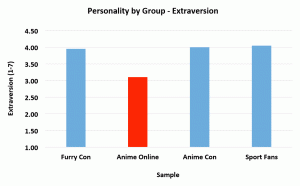
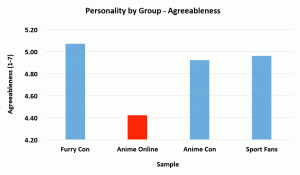
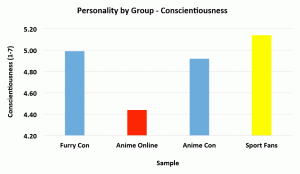
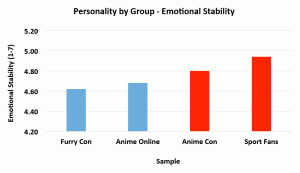
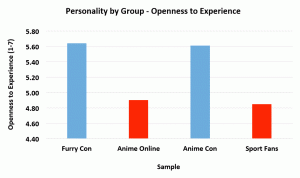
I am confused about the agreeableness stat listed here. Do you mean agreeable as in; more willing to take risks/take part in a new sensation or experience (Say for example, trying out a new ice cream flavor), or do you mean agreeableness as in; receptiveness to new ideas or change? I know these might sound similar, I apologize for any confusion, but my basic question is one of semantics: I have heard the term “agreeable” used to describe if someone is in a foul mood or not, i.e., “He’s being very disagreeable right now, don’t talk to him”. But I’ve also heard it used to describe someone’s openness to new things, i.e., “He’s quite agreeable when it comes to change.”
In short, are you saying furries are grumpy, or just close-minded?
(I apologize again for the long winded response.)
It’s “agreeableness” as defined by the TEN ITEM PERSONALITY MEASURE (TIPI) Also found in footnote (above) but below the main charts 🙂
Heya, I was wondering what the average results were for the online furry sample in study 2.
Looking at the results of the Anime Con group vs Anime Online group it seems that the differences could be quite big between furries online vs in a furry con.
That’s an excellent and very specific question. Dr Courtney “Nuka” Plante suggests that you reach out to him directly where he can run specific analyses for you
Hi! So sorry if I’m just not reading this right, but I was very confused by this. The descriptions of each graph seems disconnected from what the graphs seem to actually show.
For example: the agreeableness of furry convention attendees seem to be about 5.0/7.0, where as the stability seems to be about 4.6/7.0. My takeaway from seeing this is that furry convention attendees are more agreeable than they are stable. But the descriptions conflict with this.
The descriptions state that furry convention attendees are LESS likely to be agreeable and that their participation in furry conventions is UNRELATED to their stability.
I would assume it’s far more likely that I’m misreading this than that there was a mistake on your end. Could you please help me understand this better?
Additionally, it might be helpful to see the grouped OCEAN personality results from not just attendees of conventions of other fandoms, but also of the general population. It’s unclear to me if all of these measurements are designed so that 4.0 is the average score for each personality trait, or some other value.
Thanks in advance, and thanks for all of the science y’all do!
Don’t be sorry, and thank you for the question/comment 🙂 It’s a bit difficult to meaningfully compare traits in a 1-to-1 fashion (e.g., a “5” on agreeableness is hard to compare meaningfully to a “5” on, say, openness to experience). While they were both assessed on a 7-point Likert scale, they’re different traits with different distributions, so it’s sort of like comparing apples to oranges to directly compare means.
As for the stability question, what it’s saying is that, in a correlation analysis testing whether scores on a measure of fanship (how furry are you) were statistically correlated with scores on stability, the two were unrelated; i.e., a person’s fanship scores did not help us predict what their stability scores were…
Your questions are good ones, though. The ambiguity you’re inferring is likely the result of the truncated nature of describing these analyses for the website, making them as accessible as possible to a much wider audience, as opposed to a write-up for peer-review or other academic medium. We do a more thorough job discussing personality traits in our latest book, which you can read/download for free here. It’s been updated and has fuller descriptions of personality traits in the fandom, if you’re interested 🙂 If you wish to discuss this further, feel free to reach out to Dr Courtney Plante, the main author for this specific analysis. Thanks again for your question, and we appreciate your support of our work very much!